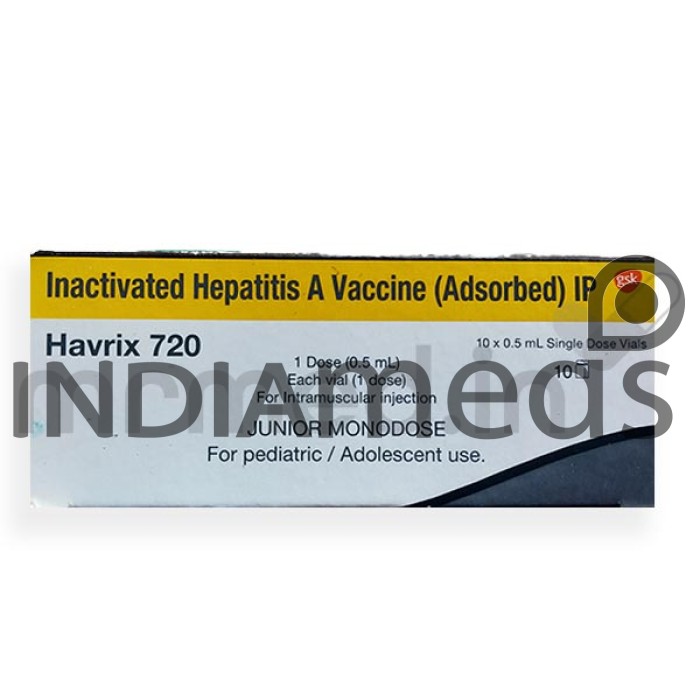Havrix 720 injection is an antiviral drug belonging to the class of inactivated vaccines containing the active ingredient Hepatitis A Vaccine. It can be mainly used for the prevention of hepatitis A virus infection. Hepatitis A infection is due to a virus that attacks the liver. It may be caught from food or drink that contains the virus. Vaccines are used to protect you against infectious diseases. This vaccine helps to protect against hepatitis A infection in people 16 years of age and older.
This vaccine is generally safe for immunocompromised individuals, including those with HIV infection or other conditions that weaken the immune system. However, their immune response to the vaccine may be diminished, reducing protection. In such cases, a healthcare provider may consider additional doses or antibody testing to assess vaccine effectiveness. If you or your child are scheduled to receive multiple vaccines, it's always a good idea to discuss the vaccination plan with your healthcare provider.
Individuals with a known severe allergic reaction (anaphylaxis) to a previous dose of this vaccine or any of its components should not receive the vaccine. It's important to inform your healthcare provider about any allergies or previous adverse reactions before getting vaccinated. The Havrix 720 injection is safe for pregnant and breastfeeding women. No study suggests that the vaccine harms the developing fetus and does not contain a live virus, and the components are not known to be harmful to breastfeeding infants.
Therapeutic Effects of Havrix 720 Injection
Pregnancy
The Havrix 720 injection is safe for pregnant women. No study suggests that the vaccine harms the developing fetus.
Breast Feeding
The Havrix 720 injection is considered safe for breastfeeding women. The vaccine does not contain a live virus, and the components are not known to be harmful to breastfeeding infants.
Lungs
Patients with pre-existing lung disease should consult a healthcare provider before taking the Havrix 720 injection.
Liver
The Havrix 720 injection is considered safe for the liver and is designed to protect against Hepatitis A infection, which can cause serious liver damage and other complications.
Alcohol
The Havrix 720 injection is safe for individuals who consume alcohol. There is no evidence to suggest that alcohol consumption affects the safety or effectiveness of the vaccine.
Driving
The Havrix 720 injection is not known to affect driving ability. It is an injected vaccine that does not contain substances known to cause drowsiness or impair motor skills.
Serious
- Allergic reactions such as skin problems, swelling, breathing difficulty, etc.
Common
- Headache
- Pain and redness at the injection site
- Tiredness
- Loss of appetite
- Stomach upset
- Fever
- Drowsiness
- Irritability
Infected individuals who do not wash their hands properly after using the bathroom can have HAV on their hands. If these infected individuals touch objects or surfaces without proper handwashing, the virus can be transferred to those objects. Therefore, these activities should be avoided. Additionally, practicing proper food hygiene and sanitation measures is important in preventing the transmission of HAV through contaminated food and water.
The Havrix 720 injection is an inactivated (killed) virus vaccine.
Havrix 720 injection can be administered into the upper arm for adults and older children. It can be administered in the thigh muscle of toddlers for younger children.
Yes. Two doses are recommended. The second dose is given by six months after the first dose.
Yes. CDC recommends that a pregnant woman at risk of hepatitis A infection or risk of a severe outcome of hepatitis A infection during pregnancy should be vaccinated.
The common side effect of Havrix 720 injection is a sore arm, which happens to one out of two adults and one out of five children. Less common side effects include headache, loss of appetite, low-grade fever, or tiredness.
Yes. Individuals who recently have been exposed to hepatitis A and who previously have not had this vaccine should be given a single dose of Havrix 720 injection as soon as possible, within two weeks of exposure.
Avoid receiving multiple vaccines. It's necessary to inform your healthcare provider about all the vaccines you have recently received or are scheduled to receive so they can plan the vaccination schedule accordingly.
No, hepatitis A is caused by a different virus from the viruses that cause hepatitis B or C. Also, the hepatitis A virus does not turn into the other hepatitis viruses.
Molecule name: Hepatitis A Vaccine | Therapeutic class: Antiviral |
Pharmacological class: Inactivated Vaccine | Indications: Prevention from Hepatitis A virus infection |





